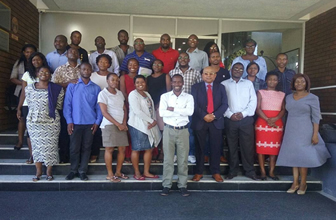- April 5, 2018
- Posted by: admin
- Category: Current News

 The accumulation of arrears on Zimbabwe’s external debt since the year 2000 has limited the country’s access to foreign loans on favourable terms. In addition, budgetary support through grants has also dwindled over the years. Donor support through grants has been channeled outside of the budget system, thus making it difficult for Government to account for or direct the funds to critical activities.
The accumulation of arrears on Zimbabwe’s external debt since the year 2000 has limited the country’s access to foreign loans on favourable terms. In addition, budgetary support through grants has also dwindled over the years. Donor support through grants has been channeled outside of the budget system, thus making it difficult for Government to account for or direct the funds to critical activities.
Recognising the importance of external financing in supporting development, the Government of Zimbabwe has stepped up the re-engagement process with an aim to clear external debt arrears.
Once the arrears have been cleared, the government will be eligible to receive foreign grants as well as borrow from external sources such as multilateral institutions, international financial markets and other bilateral financiers.The success of the arrears clearance process and future access to external financing on favourable terms hinges on the availability of a Government team with good negotiation skills.
In this regard, as part of efforts to strengthen the negotiation capacity of its officials, the Ministry of Finance and Economic Development in Zimbabwe organised an In-country workshop on Grants and Loans Negotiation from 8 to 19 January 2018 at Holiday Inn in Mutare, Zimbabwe. The main objectives of the workshop were to:
• Enhance officials’ understanding of the grants and loans negotiations process;
• Highlight key aspects of legal and institutional framework necessary for effective loan negotiations;
• Expose participants to the various sources of external finance; and
• Enhance participants’ knowledge on the key elements of grants and loan contracts.
Mrs Margiretta Makuwaza, the Director of International Cooperation in the Ministry of Finance officially opened the workshop. In her remarks, she noted that the training would go a long way in supporting the attainment of the Ministry’s targets, which include designing strategies to re-engage with creditors and donors as well as strengthening technical and financial skills to review loan and grant contracts. She highlighted that previous Need Assessments Surveys had identified skills gaps among the Ministry’s officials in the area of negotiation. She added that the external financing landscape has evolved tremendously over the past decade, hence the need for government to enhance the knowledge and competences of public sector officials on negotiating grants and loans.
The workshop which was facilitated by Ms. Yvonne Quansah of the Ministry of Finance in Ghana; Mr. Nardeo Useree, an independent consultant; and Ms. Josephine Tito MEFMI Programme Manager in the Debt Management Programme was delivered through a combination of PowerPoint presentations, group work and hands-on exercises. The participants conducted simulation exercises on negotiating grants and loans by analysing hypothetical loan/grant agreements and role played as borrowers and lenders. This aimed at reinforcing the skills learnt during the workshop. Some of the topics covered in the workshop were:
• Loan and grant cycle;
• Development financing landscape and Implications for negotiations i.e. evolving sources of finance;
• External financing instruments;
• Disbursement policies, procedures and terms;
• Preparations for negotiations;
• Negotiation theory and practice;
• Negotiation tips and tactics;
• Interpretation of loan /grant agreements;
• Financial evaluation techniques;
• Debt portfolio review;
• Negotiating commercial loans including sovereign bonds
• Negotiating bilateral loans;
• Negotiating trade credits and Islamic Finance Instruments,
• Negotiating multilateral loans;
• Negotiating Public Private Partnership contracts;
• Cost and risk management techniques; and
• Case studies for loan negotiations.
The main output of the workshop was that participants gained knowledge and skills for effective negotiation of grants and loan contracts. In addition, participants developed a draft country negotiation checklist based on sound practice. The checklists included action plans, steps and considerations when preparing for negotiation.
